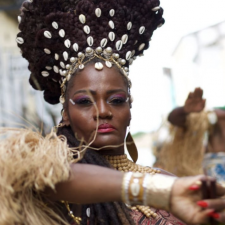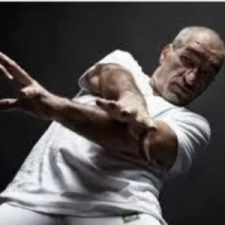The Embodied Dialogues residency is a collaboration between Duke University Professor of Dance, Ava LaVonne Vinesett and UNC-Charlotte College of Arts + Architecture’s Associate Professor of Dance, Tamara Williams. For a third year, this dedicated collaborative will focus on African Brazilian dance and music forms, bringing together dancers, writers, musicians and artists to practice, share, recover and create danced legacies. Friday, April 5 will culminate with, Essência — an “in-process” and integrative experience, guided by Rosangela Silvestre, founder of the Silvestre Dance Technique.
*Classes and the inaugural showing are open to the Duke and Durham community*
Event Schedule
Wednesday, April 3 Noon - 1 p.m. | Conversation and lunch with all artists
Ruby 124 | Artists and participants discuss the currents in their practice and the significance and abundance of place—however defined—in their work.
Wednesday, April 3 6:15 - 7:30 p.m. | Master class
Nildinha Fonseca during Ava LaVonneVinesett's African Tech II
Wednesday, April 3 7:30 - 8:45 p.m. Percussion class
Jose Ricardo and Luciano Xavier during Ava LaVonne Vinesett's Performance: African Repertory
Thursday, April 4 11:45 - 1 p.m. | Vania Oliveira
Ruby 201 | Vania Oliveira visits Ife Presswood's Hip-hop class
Thursday, April 4 3:05 - 4:20 p.m. | Mestre Jelon Vieira
Ruby 201 | Mestre Jelon Vieira visits Katya Wesolowski's Capoeira: Dance/Martial Arts
Thursday, April 4 4:40-6:15 p.m. | Master class
Ruby 224 | Master class with Rosangela Silvestre during Ava LaVonne Vinesett's African Tech I
Friday, April 5 | Essência/mini-intensive/in-process sharing
9:30 AM-12:30 p.m. composition/workshop/discovery class
4:30-6:30 p.m. Dancers/musicians/artists/participants return for open rehearsal/showing
Meet the Presenters
Nildinha Fonseca is a Mother, Black woman and master's student in dance at UFBA. Fonseca is a dance teacher, researcher of dances of African matrix and Brazilian folklore, choreographer and dancer. She is the assistant director and choreographer of the Folkloric Ballet of Bahia and a soloist with the company. She is responsible for training the company in modern dance techniques. Coordinator of the Balé Jr. course from Balé Folclórico da Bahia. Artistic director/coordinator of the project Encontro dos Artistes Candomblecist, Fonseca has extensive touring experience performing in Brazil, throughout Europe, and in over 120 cities in the United States, Australia, Mexico and Canada.
Rosangela Silvestre is a choreographer, instructor, dancer and creator of the Silvester Dance Technique, and is a native of Salvador, Bahia, Brazil, where she graduated with a Bachelor’s Degree in Dance. Her post-graduate work specialized in choreography, and she earned her degree from the Federal University of Bahia (UFBA).
She has researched dance and music in Brazil, India, Egypt, Senegal and Cuba as part of her ever-evolving and eclectic palette of movement. She acquired training in such diverse techniques as Martha Graham, Limon, Horton, floor bar, classic ballet and Dunham Technique, and has experienced diverse dance expressions such as Germany theater dance, contemporary, folkloric, as well as traditional dances of Africa and other continents. Her instructors include Raimundo Bispo dos Santos (Mestre King), Mercedes Baptista, Clayde Morgan and Carlos Moraes and Nelma Seixas, among others, beginning in the late 1970s.
José Ricardo Sousa is a master percussionist and preserver of traditional African-Brazilian music and dance. He is the musical director, composer, musician and instructor of traditional Afro-Brazilian dance and music for Bahia’s celebrated company, the Balé Folclórico da Bahia. José Ricardo started his arts career in percussion and dance under the tutelage of Mestre King at the SESC School of the Arts in 1985. José Ricardo has toured and taught in Brazil, Europe and in more than 120 cities in the United States, Australia, Malaysia, Colombia, Argentina, Chile, Canada, Togo and Benin. José Ricardo received the prestigious Lester Horton award for excellence in music for dance in 2009 with Luiz Badaró and Mario Pallais.
Luciano Xavier Da Silva was born in Salvador, Bahia, and began drumming inside Candomble houses as a child. He was a percussion student of Ilê Aiyê and entered the Axé Project (Projeto Axé) where he became a musician. He studied with Dailha Mendes, Dandha da Hora, Marivaldo, Mario Bomba and Givaldo Pereira. Later, Xavier participated in Gicá, a dance company of Projeto Axé, and it was there that he started training with the late Augusto Omolu.
Vania Oliveira stands as a prominent figure in Brazil's dance scene, revered for her expertise in the rhythms of the Blocos Afro. From 2000 to 2006, she held the prestigious title of queen within the Bloco Afro Malê Debalê, and from 2001 to 2014, she adorned the position of princess within the Bloco Afro Ilê Aiyê. Currently pursuing doctoral studies in the Multi-Disciplinary Program at the Federal University of Bahia, her scholarly endeavors center around the exploration of Blocos Afro dances and their communities in Salvador, Bahia.
Tamara Williams is an assistant professor at UNCC and earned her M.F.A. from Hollins University. Her choreography has been presented internationally in Serbia, Switzerland, Trinidad, Jamaica, Mexico and Brazil. Moving Spirits, Inc. is her contemporary arts organization dedicated to performing, researching, documenting and producing African Diaspora arts. Williams’ scholarly work includes: Giving Life to Movement: The Silvestre Dance Technique; "Reviving Culture Through Ring Shout," published in The Dancer-Citizen; and The African Diaspora and Civic Responsibility (forthcoming). Her awards include two Faculty Research Grants which support her in-depth study and investigation of Ring Shout Dance Traditions and Òrìṣà dances. Williams was commissioned by the Kaatsbaan International Dance Center to create a new work for Moving Spirits, Inc. in 2018; the new work premiered during her Kaatsbaan UpStream Residency in New York's Hudson Valley. She has received several Culture Blocks grants from the Mecklenburg County Arts & Science Council, and the funding supports Moving Spirits' ongoing free African diaspora dance workshops throughout the Charlotte community. She is a College of Arts + Architecture faculty recipient of the 2019-2020 Board of Governors Teaching Award. In 2021, she became an Arts and Science Council Emerging Creative Fellowship recipient to continue her research in Ring Shout traditions in the low country of the United States. She was commissioned by The National Center for Choreography to create a new dance film for her company, Moving Spirits, Inc. The film, ÌBÀ OBÌNRIN, is an award-winning film that has been screened nationally and internationally since June 2021.
Mestre Jelon Vieira, founder of Capoeira Luanda, is a world-renowned master and teacher of capoeira. Born in Santo Amaro da Purificação, Bahia, Brazil, in 1953, he started learning capoeira Angola at the age of 10 with Mestre Emerito and later with Mestre Bobô. In 1969, he met Mestre Eziquiel, with whom he studied capoeira regional. He also had the honor of attending classes at Mestre Bimba’s academy.
In 1977, Vieira and the late Loremil Machado formed the Capoeiras of Bahia (later changed to DanceBrazil at the suggestion of Alvin Ailey), the first to bring traditional Afro-Brazilian dance and capoeira to the United States. As artistic director of the Capoeira Foundation and DanceBrazil, Vieira has devoted more than 30 years to bringing electrifying performances to audiences in the United States, Brazil, Asia and Europe.
Vieira has taught capoeira at numerous prestigious colleges across the United States. As a guest master at universities including Yale, Harvard, Stanford and Princeton, Vieira has immersed his students in not only the techniques of capoeira but also in the philosophy surrounding the art form. For Vieira, capoeira is more than art, but is a way of life. In 2008, the National Endowment for the Arts honored Vieira’s dedication to educating diverse audiences on his culture and capoeira, as well as his commitment to giving back to under-resourced communities with a National Heritage Fellowship.







